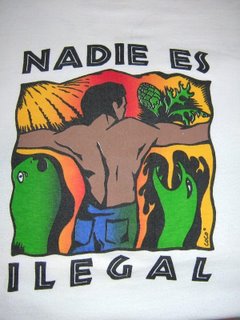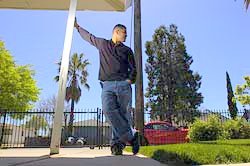

They grow up with big dreams until their illegal status forecloses their future
By Deepa Ranganathan -- Bee Staff Writer
Published 2:15 am PDT Wednesday, April 19, 2006
Story appeared on Page A1 of The Bee
Beto's rage is nearly palpable.
The 22-year-old once dreamed of becoming a firefighter or a police officer. He wanted an assignment in a tough neighborhood, like the block in south Sacramento where he grew up.
Beto's family smuggled him over the Mexican border illegally when he was 5. From kindergarten to 12th grade, he was taught the American values of upward mobility and self-determination. He could do anything if he just tried hard, he learned.
Beto, 22, wanted to become a police officer or firefighter. But without papers, that's impossible. Instead, the high school graduate is working construction jobs under the table.
Sacramento Bee/Hector Amezcua
But a series of abrupt denials in high school taught Beto that he was up against big obstacles. Without a Social Security number, there was no driver's license, no after-school job that lasted longer than a few weeks, no financial aid for college.
Now, Beto smolders with frustration. Harboring only faint memories of the country he left behind, he's locked in a shadow world where his opportunities for betterment are almost nil.
Beto spoke to The Bee on the condition his real name would not be used. He doesn't want to damage future attempts at legal status. Beto is his family nickname. A man who helped raise him in a home for at-risk kids verified details of his story and a spokesman for the Sacramento City Unified School District confirmed that he graduated from a district high school.
Beto works construction jobs, accepting payment under the table. He drives his girlfriend's car, hoping no one will pull him over. Despair creeps into his voice when he speaks about his future. "I can't look forward to becoming anything else than what I am," he says.
About 1.6 million undocumented children live in the United States, according to an analysis last year by the Pew Hispanic Center.
Every year, American high schools graduate 65,000 students who have big aspirations but lack legal status.
Many, like Beto, crossed the Mexican-American border when they were small children, following relatives who sought first-world prosperity. Once in the U.S., they enrolled in a public school system that asked no questions about how they got there.
Thanks to a 1982 Supreme Court ruling, Plyler v. Doe, public elementary and secondary schools cannot deny admission to undocumented children. Nor can they require families to provide proof of legal status.
All bets are off once children grow up. Plyler v. Doe doesn't change the fact that they're undocumented, said Rachel Moran, a professor at Boalt Hall School of Law at the University of California, Berkeley.
"The irony, of course, is that Plyler prepares people to expect the full American dream," she said. "But it only promised them a minimum of respect - and that may not include full and equal access to higher education."
Americans are deeply ambivalent about providing public benefits to undocumented residents. California is no exception. Proposition 187, approved by a 3-to-2 margin in 1994 and later declared unconstitutional, would have denied illegal immigrants access to public education, health care and most social services.
It's hard not to empathize with undocumented young people, but providing free benefits creates an incentive to enter the United States illegally, said Ira Mehlman, spokesman for the Federation for American Immigration Reform, which seeks to end illegal immigration and curtail legal immigration.
Two bills recently introduced in Congress seek radically different outcomes for undocumented U.S. residents. The House bill, which has sparked protests all over the nation, would make them felons. The Senate bill would grant many of them a pathway to legal status.
A provision in the Senate bill, called the DREAM Act, would allow some undocumented residents to qualify for legal residency if they arrived in this country before age 16 and at least five years before the bill's enactment.
Both bills have stalled. Meanwhile, Anthony Lopez, a former counselor at rural Ukiah High School, said he's grown frustrated seeing promising but undocumented students give up.
Undocumented students at California high schools can qualify for in-state tuition to public colleges and universities. But they can't get state or federal aid. Only 5 percent to 10 percent of undocumented high school graduates go on to college, according to the National Immigration Law Center, an immigrant advocacy group.
Even when undocumented students do manage college, they eventually run up against barriers more discouraging than border fences they vaguely remember crossing. Cheli, a 22-year-old senior at California State University, Sacramento, recalls running barefoot across a six-lane freeway to get to the United States. She was 9 years old.
Now Cheli is requesting adjustments to the gown she'll wear next month to graduate.
Cheli spoke to The Bee on condition she would be identified by a nickname, fearing she might jeopardize a pending application for legal status. Her high school counselor verified her story.
A striking young woman with a biting wit, Cheli has wanted all her life to be a math teacher. But after she finished taking a five-hour exam last semester to get her credential, she was told her results would be canceled within 16 days unless she sent proof of a valid California ID. As she cried in the hallway, one of her instructors asked her why she didn't just apply for a driver's license.
She wonders why she worked so hard. She wonders why Lopez, her counselor at Ukiah High, encouraged her to aim high.
"Everyone kept telling me, 'Keep trying, do your best, and the reward will be there at the end,' " she said. "Now I feel like I'm at the end, and there's no reward."
The high walls that frustrate Cheli loom for many undocumented children, no matter how motivated they are.
As a sophomore at McClatchy High School, Beto signed up for a driver's education class to get his learner's permit. He submitted his test and waited for a result that never came.
No Social Security number, no permit, his teacher told him. No permit, no license.
"Imagine if someone tells you you can't get it. You can't ever get it," Beto said. "I started feeling, man, this is going to be a big problem."
Beto, like Cheli, grew up knowing there was something furtive about the way he had come to the United States. His mother came to Sacramento and cleaned houses after her husband was murdered in Mexico. A year later, his aunt and uncle, both legal residents, put him in the back seat of a car, told him to pretend he was sleeping and got him through customs by flashing their own son's birth certificate, he says.
As a child, Beto didn't inquire too deeply about his status. It didn't seem to matter, and he says his teachers and friends never asked him about it.
Typically, school districts in California ask all families only for proof that they live within the district - a utility bill often suffices - and proof of each child's age. If a birth or baptismal certificate is unavailable, often parents can simply make a sworn statement that the child is old enough to start kindergarten.
Districts have "no obligation or authority to enforce immigration laws," said Michael Herschel, deputy general counsel for the state Department of Education. Nor can the state require schools to report undocumented students to federal officials.
"It's really not a good thing for school districts to try to become experts in immigration law," Herschel said. "It interferes with their mission."
Beto skipped the senior class trip to Cancún but was too embarrassed to tell anyone why: He was afraid he wouldn't be able to re-enter the United States.
He pursued an associate's degree in criminal justice for about a year at Sacramento City College. But the tuition was hard to swing on his unsteady construction paycheck, and Beto didn't see the point of trying when no police department would employ him at the end.
"I didn't choose to be an illegal immigrant," he says, leaning forward, his round face growing red. "I'm more American than Mexican. I grew up here like everybody else. So why can't I be the same?"
Beto has visited half a dozen immigration lawyers who have accepted a fee and done nothing. He doesn't think he'll ever become a legal resident, he says.
Cheli's sister, a U.S. citizen, has applied to sponsor her, but the application won't even be considered for at least five years, Cheli says. At that point, she may have to leave the country as part of the process and could be barred from re-entering for up to 10 years.
Cheli tries to be upbeat but verges on tears when she tells her story in Cal State's crowded student union.
"Every door I see open, it shuts on me," she says.
++++++++++++++++++++++++++++++++++++++++++++++++++++
About the writer:
The Bee's Deepa Ranganathan can be reached at (916) 321-1962 or dranganathan@sacbee.com
http://www.sacbee.com/content/news/story/14244972p-15063310c.html
miércoles, abril 19, 2006
Trapped in the shadows: Sacra Bee = 04-19-2006
Posted by
Unknown
at
5:12 p.m.
![]()

Suscribirse a:
Comentarios de la entrada (Atom)





0 comments:
Publicar un comentario